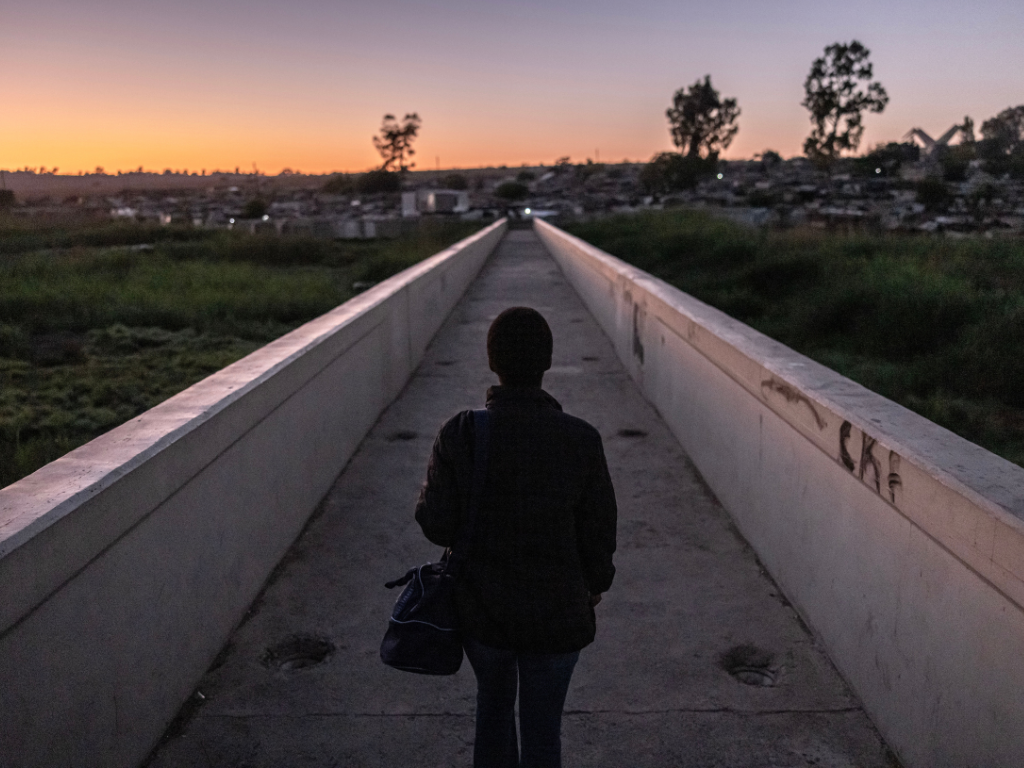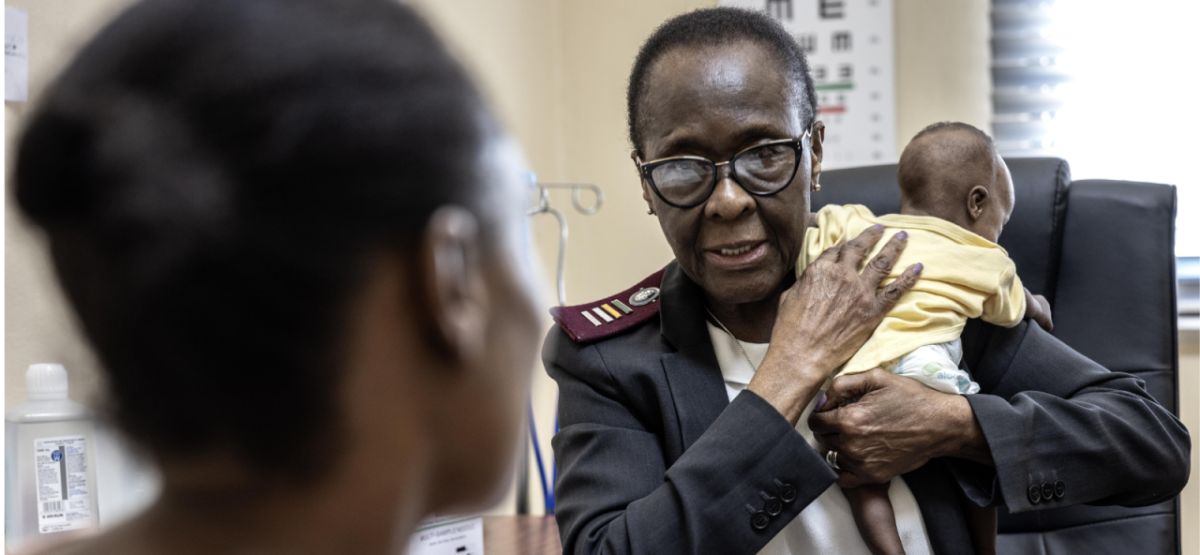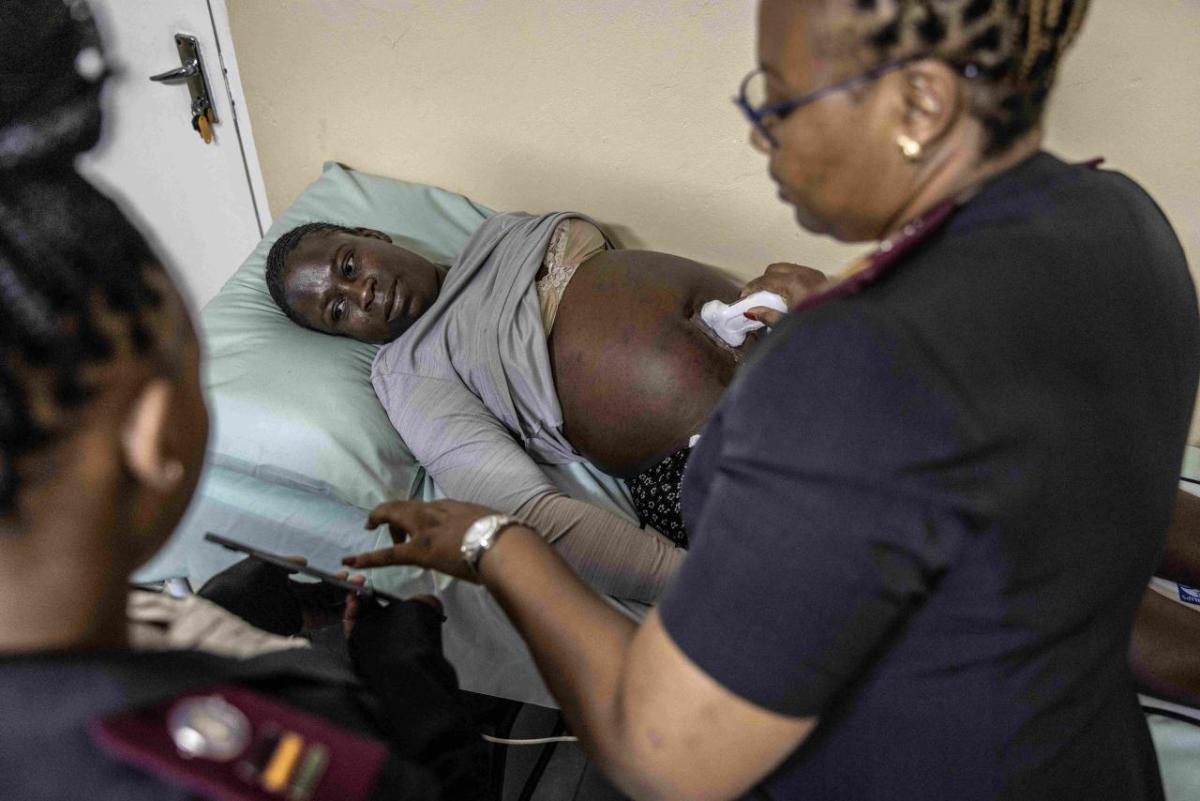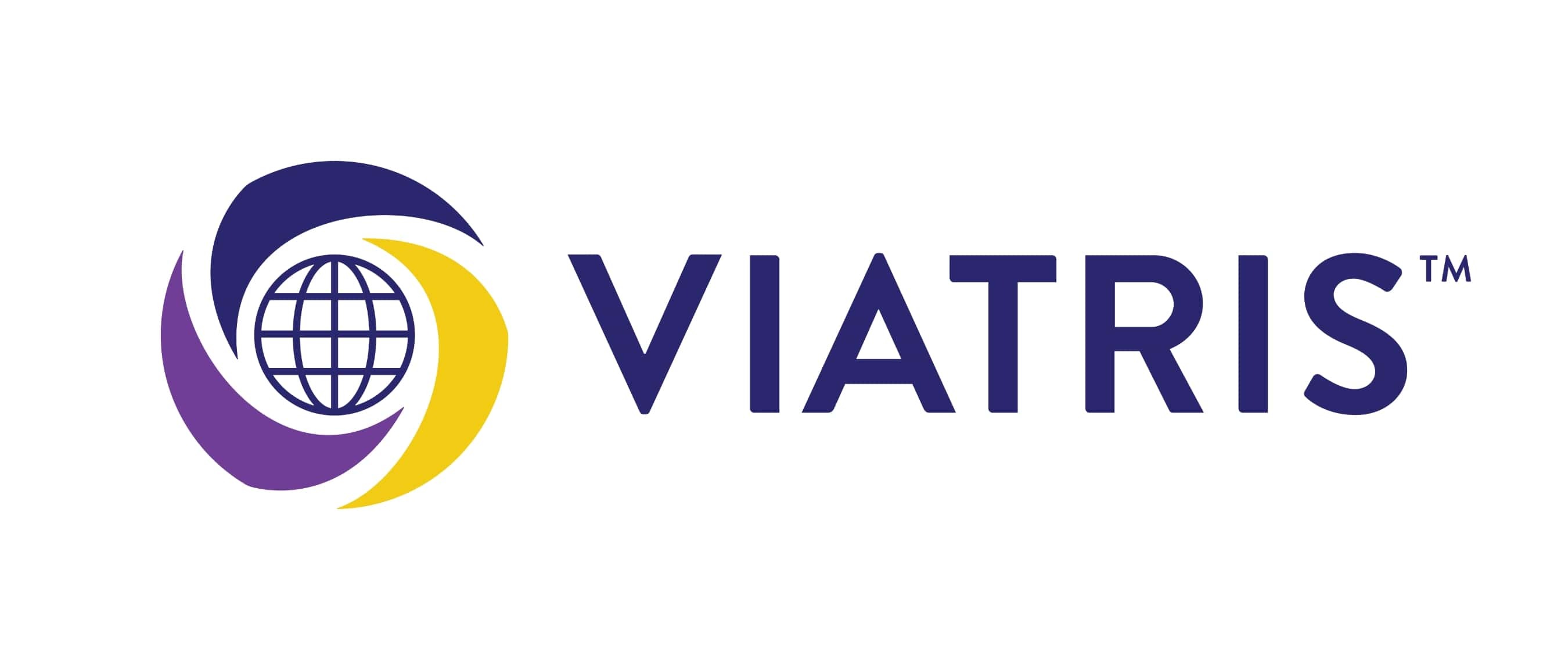‘It’s the Nearness That You Are There For:’ Primary Healthcare Clinic Offers a Path Forward
By: Niki Kapsambelis
Audio File
In the morning, as the South African sun rises over the tin roofs and occasional satellite dishes of the surrounding neighborhood, Sister Thandi Mgcina walks through the spotless hallway of the medical clinic she has overseen since its opening in 2022.
It is a short walk that has taken most of her four decades as a community health nurse to accomplish. Now 74, she has taken care of the people of Diepsloot, a sprawling settlement of more than 300,000 people just north of Johannesburg, since its beginnings in the mid-1990s, when she was a community health nurse working for the city.
When the clinic first opened – built with funds provided by Viatris in partnership with Rhiza Babuyile, a local nonprofit – Sister Thandi cried.
“I look at these walls and say, ‘You know what? Thank you, Lord. I never thought I would work this hard,’” she said. “So even the community of Diepsloot, they are having a proper clinic where they are treated with dignity.”
Listen to Sister Thandi talk about the importance of community healthcare.
Diepsloot, whose name translates to “deep ditch” in Afrikaans, was founded in the mid-1990s as a temporary settlement for people who had been evicted from the Honeydew, Zevenfontein and Alexandra suburbs of Johannesburg. The population was much smaller then; a public health clinic was established in 2000, which Thandi opened while working for the city of Johannesburg. As more people moved in, the government added a second clinic. Still, demand grew.
Today, the population has swelled dramatically, far outstripping available resources, including healthcare. Diepsloot expanded into 13 extensions, many without water, electricity or sewage.
The situation worried Rashuping “Rush” Morake, who leads Rhiza Babuyile. Though the NGO provides many community development services, Rush considers the most important one to be access to healthcare.
“You can do all the initiatives within the community. You can do anything, you can provide them with money. But if they don’t have quality healthcare, they won’t be able to do much with their lives,” he said. “They can’t pass it forward to the next generation, they won’t be able to be sustainable. And that’s why healthcare is our foundation and the backbone of our organization.”
To address what he recognized was a growing crisis, Rush reached out to Sister Thandi, who was well known and trusted in the community.
A mother of three and a grandmother of one, Thandi graduated from nursing school in 1973, when apartheid was still the rule of law in South Africa. Throughout her career, community nursing was her passion, and she developed strong ties with both the people of Diepsloot and the Department of Health, which provides care and medicines for the vast majority of the township’s population. She retired in 2014.
When Rush and his business partner, Alef Meulenberg, approached her with their idea for a clinic in Diepsloot – something that bridged the gap between public clinics, which could not meet the exploding demand of the population, and private clinics, which were financially beyond the means of most of the township’s people – she was skeptical.
“My first question was, ‘Are you doctors or are you nurses?’ Because I couldn’t understand how they can establish a clinic when they don’t have any knowledge,” she said. “I thought it was a challenge working with people who don’t have the medical background.”
She agreed to think it over, went home and prayed about it. Then she came back and agreed: she would help. She was back to work in Diepsloot by October 2015.
At first, they started with a mobile clinic, offering care within a specially equipped van. Eventually, Rhiza Babuyile added a trailer-style building to expand services. They provided antenatal services for women, HIV and AIDS testing and counseling, prostate screening for men and other key services. As Sister Thandi trained nurses who worked for her, she emphasized the importance of kindness and empathy when speaking with patients; in turn, people flocked to them.
By 2021, Alef and Rush approached Thandi with a new idea: build a bricks-and-mortar clinic to serve the people of Diepsloot.
“I’ll see it in my grave,” she told them. “I don’t see you people building a clinic.”
But they persisted. With the help of private partnerships, they believed they could make their vision a reality.
They proposed the project to Viatris, which had been sponsoring the mobile clinic and other Rhiza initiatives such as part of its commitment to corporate social responsibility and creating sustainability, according to Nashnee Persad, financial director for Viatris in South Africa.
“Access has always been one of our biggest missions,” said Nashnee. “We were looking for somebody who aligned to our values, who spoke to our mission, and was also sustainable – we wanted to have a real impact, a sustained impact, over the years.”
The company agreed to serve as the primary donor for the building; the Philips Foundation provided diagnostic and healthcare technology.
“It’s a very vital role,” Rush said of the public-private partnerships that created the clinic. “It really helps us do what is needed on the ground: access to quality healthcare, access to medication.”
The clinic opened in August 2022. A year later, it employed 15 staff, from professional nurses to cleaners and community health workers.
Click here to learn about the experiences of community health worker Lebogeng Moumakwe.
Patients pay anywhere from 100 Rand (slightly over $5 USD) for immunizations to 300 Rand (about $16 USD) for an antenatal visit. The payments help to sustain the clinic, and they also help to empower patients: when they are paying for a service, they feel they can demand a higher quality of care.
“But what I want to emphasize: if you don’t have the money and we really assess and see that this is a needy patient, you don’t pay,” Sister Thandi said. “I think the community is really genuine. If you are (in need), then we help you.”
Part of what Sister Thandi preaches to her staff is to question the patient thoroughly. Are they working? How many children are they supporting? Have they eaten anything that day? When the answers point to a person who is struggling, the clinic staff find ways to help. Sometimes, they provide bread and tea. At least one nurse has been known to give hungry patients her lunch.
“It’s not monetary, it’s the nearness that you are there for,” Sister Thandi said. “Just show compassion, that I’m here for you.”
Listen to Sister Thandi explain the core values of nurses.
With the Diepsloot clinic serving as its flagship, Rhiza Babuyile is now expanding to smaller clinics housed in trailers to create better access to primary healthcare for people within their communities. Branded under the name Mpathy, the satellite clinics are run by nurses who become owners of the facility after paying off their initial loan, a model the NGO calls “nursepreneurship.” To date, Viatris has contributed financially to two of these clinics: one in Soweto, a suburb of Johannesburg, and one near Cape Town.
The concept is meant to provide opportunities for economic empowerment to the nurses as well as any staff they decide to hire, Rush said. Ultimately, Rhiza Babuyile hopes to open 70 Mpathy clinics within the next decade.
As she closes the clinic each evening, Sister Thandi makes a point of reflecting on the day: How well did she treat her patients? Did she truly get to know them? Did she make their lives better? It is how she measures success.
“Did I do all those things, as a nurse?” she said. And if she is able to fall asleep that night, she knows the answer: “Then I’ll think, ‘Yes, I did.’”
Photos by Finbarr O’Reilly




